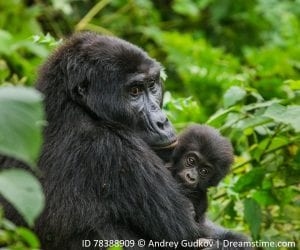Human beings account for only 0.01 percent of all living things, even though there are more than 7.6 billion people on Earth today. Humans have managed, however, to have a disproportionate impact on the health of the planet, irreparably damaging the health and vitality of the planet and the ecosystems that surround us. Either directly through practices such as habitat destruction, deforestation, or the transportation of invasive species, or indirectly by contributing to climate change, we are decreasing Earth’s biodiversity, which is essential to both human and planetary health.
Habitat Destruction/Fragmentation
A primary driver of biodiversity loss is the destruction and fragmentation of wild spaces. Forests, which are home to 80 percent of land animals and plants, are being cut down at a rate ten times higher than any possible level of regrowth. Deforestation happens through human activities like clear-cutting for agriculture, ranching, and development, and unsustainable logging practices. Agriculture, ranching, and development also result in the destruction and fragmentation of other types of ecosystems, and as the human population grows, the demand that drives each of these practices increases, further exacerbating their impact on biodiversity.
Invasive Species
Over 42 percent of threatened or endangered species are at risk primarily due to invasive species, which are transported between ecosystems by human activity, either intentionally or unintentionally. Ecosystems and species that are unable to adapt to the intruders experience a loss of biodiversity, as the invasive species out-competes the native species for necessary resources.
Warming, Acidified Oceans
Climate change is resulting in the warming and acidification of our oceans, which has already resulted in the loss of 19 percent of the planet’s coral reefs. Over a quarter of the ocean’s fish depend on coral reefs for survival, but an additional 35 percent of reefs are under threat of loss in the next 20 to 40 years. As the ocean’s coral reefs disappear, so do the species that rely on them.
Species are Becoming Threatened and Worse
Although determining the exact rate at which we are losing species is difficult, today there are at least 26,000 species listed as threatened. Habitat loss, whether caused directly by human activities like deforestation or habitat fragmentation, or indirectly by the ramifications of man-made climate change, is resulting in the loss of biodiversity on a massive, global scale. Because the causes of our current biodiversity crisis rest solely in the hands of human activity and consumption, our rapid population growth will compound the problem.




